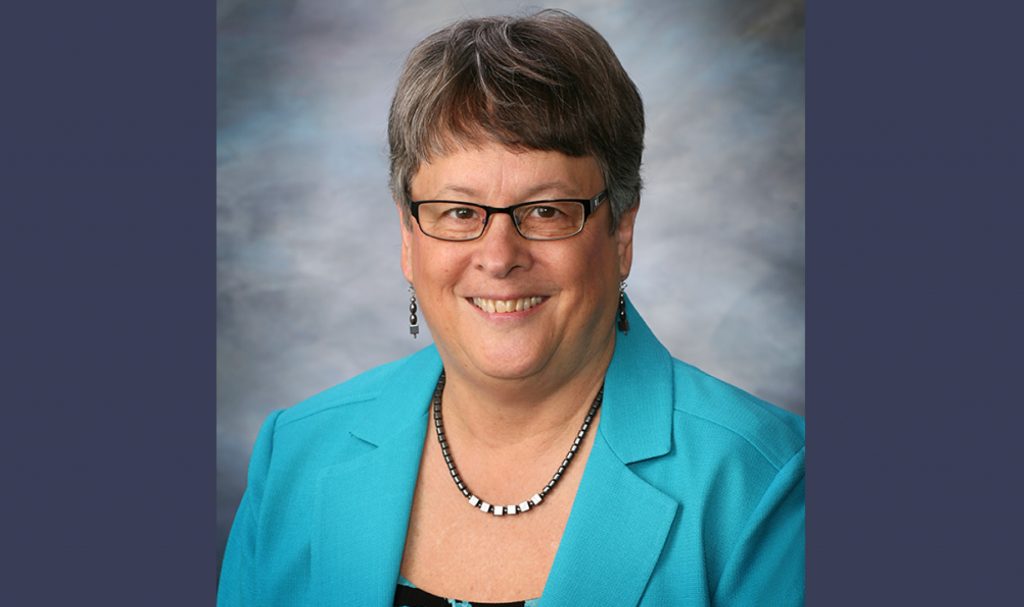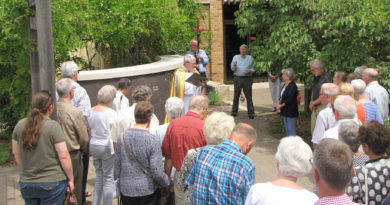Congregation presidents attend UISG meeting, papal audience
By Dan Russo
Witness Editor
DUBUQUE — Two presidents of women’s religious congregations based in the Archdiocese of Dubuque recently attended a major meeting in Rome of the International Union of Superiors General (UISG), a worldwide organization that provides a forum for leaders of Institutes of Catholic Women Religious.
Sisters Teri Hadro, BVM, head of the Sisters of Charity of the Blessed Virgin Mary, and Sister Cathy (Kate) Katoski, OSF, head of the Franciscan Sisters of the Holy Family, traveled to Rome to join hundreds of other superiors for the gathering May 9-13. The events featured prayer, in-depth discussion of issues, and a private audience with Pope Francis.
Although the papal audience generated intense news coverage globally because of the pope’s response to a sister’s question about the possibility of women becoming deacons (See the article on page 13), this was only one small part of a conference that covered a lot of ground.
 “The opportunity to be in one room with women who head 870 Congregations of Women Religious across the globe, to realize that each one and all of us are committed to a life dedicated to assisting others to know God’s love is a privilege, so I am grateful for the opportunity,” reflected Sister Teri. “Even better, it was evident in this meeting that women religious across the world are finding more and more ways to join hands with each other for the benefit of so many.”
“The opportunity to be in one room with women who head 870 Congregations of Women Religious across the globe, to realize that each one and all of us are committed to a life dedicated to assisting others to know God’s love is a privilege, so I am grateful for the opportunity,” reflected Sister Teri. “Even better, it was evident in this meeting that women religious across the world are finding more and more ways to join hands with each other for the benefit of so many.”
The meeting, which last occurred in 2013, had the theme this year of “Weaving Global Solidarity for Life.” Sisters from around the world were able to listen to talks in their own languages through the use of translators and technology. There were four major addresses: Sister Carol Zinn, SSJ (US) on the relationship between care of Earth and economic poverty; Sister Mary Sujita, SND (India) on the concept of solidarity as an expression of how women religious live when they are present to individuals and groups on the margins; Sister Grazia Loparco, FMA (Italy) on the 50-year history of the UISG, and Sister Miriam Ambrosio, IDP (Brazil) on the subject of our lives as witness to God’s love in the world.
Sister Cathy emailed updates to her congregation periodically during the meeting, reflecting on the content.
“Today’s primary talk was “Solidarity for Life on the Periphery” by Sister Mary Sujita from India,” wrote Sister Cathy in one email. “Mary was a delightful, passionate speaker, calling us, as Pope Francis has, to meet our God on the periphery. She pointed out that our world of dehumanizing poverty, conflicts, refugees and human trafficking challenge us all to be women of global solidarity.”
The table discussions provided further insights to those who attended.
“At our table we 10 from different countries had good conversations about the periphery in our globe, in our local areas and even in our local houses,” wrote Sister Cathy. “Given so many retired in our congregations, we felt called to encourage all to meet God in all members, even the difficult person for each of us, the lonely and the isolated.”
During the papal audience, which occurred at the Vatican May 12, Pope Francis took questions from the women religious on a range of topics, including whether he would “establish an official commission to study the question” of whether women could be admitted to the diaconate. The pontiff responded that “It would be useful for the church to clarify this question,” according to reports.
The audience was a positive experience for all participants, including Pope Francis.
“Although we were in the same Paul VI auditorium with the Pope on the stage and 800 plus of us in the audience as there were three years ago, this meeting with the Pope felt much more intimate – almost as though we were having a fireside chat,” said Sister Teri. “Pope Francis seemed relaxed and eager to answer our questions. He even said that he enjoyed the questions because they made him think.”
The sisters were generally pleased with the dialogue they had with the pope, including in the case of the question that generated the most media interest.
“The pope’s answer regarding the possibility of women deacons was very well received by the religious women attending,” said Sister Cathy. “He was very clear however that he was interested in the subject, but recognized that it may not be supported by the Scriptures as we know them.”
Sister Teri clarified that the diaconate question was asked as part of a series of other questions on women’s leadership roles in the church.
“In my opinion, there was general approval about the Pope’s willingness to think about appointing a commission to study the history of women as deacons in the early church,” said Sister Teri. “However, each of the questions was careful to include a statement about the need to include women in the decision-making processes of our church at all levels. I did not hear the pope comment on specifics in this regard beyond agreeing that women needed to be part of making decisions.”
After a flurry of local and national media coverage of the pope’s response to the diaconate question, many local bishops and archbishops were asked for comment, including in the Archdiocese of Dubuque.
“Archbishop Jackels was surprised with the statement as was everyone,” said John Robbins, director of communications for the archdiocese. “He does not have an inside track to the Pope’s mind on this comment. He is open to and welcomes the work of the anticipated Task Force and it’s recommendation to Pope Francis upon which he [the Pope] may act.”
Both presidents reported that the UISG meeting was an enriching experience.
“It was a very moving experience to share with religious women around the world, often to hear of the poverty and violence that are a way of life for their people,” said Sister Cathy. Videos of the four main addresses at the meeting are available online at www.internationalunionsuperiorsgeneral.org
Photos: A photo of Sister Teri Hadro, BVM, is the cover image; Sister Kate Katoski, OSF, is featured in the body of the article.




